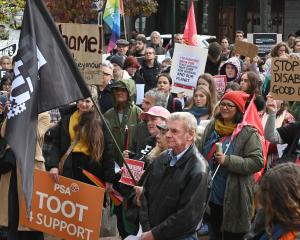The buyers of Carisbrook have three weeks to pay the Dunedin City Council for the former sports ground after an earlier plan to subdivide and develop the site to meet the $3.1million debt did not eventuate.
Calder Stewart has yet to pay the $3.1million principal for Carisbrook, despite a provision in the sale agreement which states the council will receive 60% of the proceeds stemming from any subdivision of the site up until the principal has been recouped.
The Milton-based company has until July 23 to meet its obligations, although there was confusion within the council over the date, with some documents, including the long-term plan, incorrectly assuming the transaction would be completed by June 30.
The 2016-17 annual plan clarified the issue, saying the "payment of Carisbrook was [previously] assumed to be 30 June, 2016'', and long-term budgets had been changed to reflect the correct date.
However, neither council chief executive Dr Sue Bidrose nor group chief financial officer Grant McKenzie could point to how the false assumption had occurred.
Both said the sale agreement had always indicated a final date of July 23.
No-one has been willing to discuss whether Calder Stewart has lived up to intimations made at the time of the sale.
In 2013, shortly after the sale to Calder Stewart became unconditional, Dunedin Mayor Dave Cull said it was expected the company would subdivide and sell the property for industrial use, and would give 60% of the proceeds from the sale of each site to the council to pay the debt.
But the Burns St land remains solely in the title of Calder Stewart.
No building or resource consents have been applied for in relation to the site and the council and company are unwilling to discuss the provision.
Dr Bidrose also said the company had lived up to its contractual obligations.
"It's owned by a private party now and so, within the confines of the district plan, they can do as they see fit.''
Mr McKenzie said the clause simply would have allowed the council to be repaid earlier if the site was developed.
Attempts to discuss the sale and plans for the site with owner Calder Stewart were unsuccessful.
"It's no comment,'' a person at the company's head office in Milton said when contacted.
Mr McKenzie said Calder Stewart had paid interest totalling $433,989 and rates since the 2013 sale, but confirmed none of the principal had been paid.
The company paid a $200,000 deposit and received back a $200,000 bond, which required the timely destruction of the stadium.
The council had paid interest of $425,347 based on council average cost of debt for the unpaid principal, but that was covered by Calder Stewart's payments, Mr McKenzie said.
Calder Stewart would also have to pay $95,293 on July 23 for the final six months and 23 days of interest on the site.
The council was also paying about $2000 per year to remove graffiti and maintain a 400sq m section of the former stadium in Neville St, which included the historic turnstiles, Mr McKenzie said.
A pocket park was meant to be developed on the land, but had yet to materialise.
"We are currently preparing a conservation plan for the turnstile. Once this is completed, a full timetable will be developed,'' he said.












